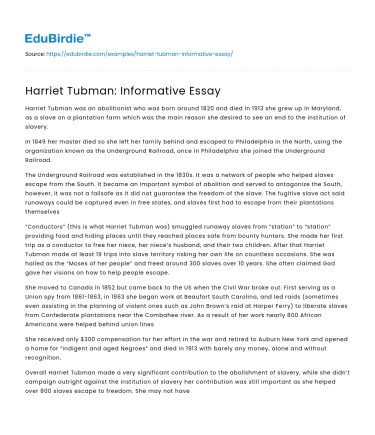Harriet Tubman was an abolitionist who was born around 1820 and died in 1913 she grew up in Maryland, as a slave on a plantation farm which was the main reason she desired to see an end to the institution of slavery.
In 1849 her master died so she left her family behind and escaped to Philadelphia in the North, using the organization known as the Underground Railroad, once in Philadelphia she joined the Underground Railroad.
Save your time!
We can take care of your essay
- Proper editing and formatting
- Free revision, title page, and bibliography
- Flexible prices and money-back guarantee
The Underground Railroad was established in the 1830s. It was a network of people who helped slaves escape from the South. It became an important symbol of abolition and served to antagonize the South, however, it was not a failsafe as it did not guarantee the freedom of the slave. The fugitive slave act said runaways could be captured even in free states, and slaves first had to escape from their plantations themselves
“Conductors” (this is what Harriet Tubman was) smuggled runaway slaves from “station” to “station” providing food and hiding places until they reached places safe from bounty hunters. She made her first trip as a conductor to free her niece, her niece’s husband, and their two children. After that Harriet Tubman made at least 19 trips into slave territory risking her own life on countless occasions. She was hailed as the “Moses of her people” and freed around 300 slaves over 10 years. She often claimed God gave her visions on how to help people escape.
She moved to Canada in 1852 but came back to the US when the Civil War broke out. First serving as a Union spy from 1861-1863, in 1863 she began work at Beaufort South Carolina, and led raids (sometimes even assisting in the planning of violent ones such as John Brown’s raid at Harper Ferry) to liberate slaves from Confederate plantations near the Combahee river. As a result of her work nearly 800 African Americans were helped behind union lines
She received only $300 compensation for her effort in the war and retired to Auburn New York and opened a home for “indigent and aged Negroes” and died in 1913 with barely any money, alone and without recognition.
Overall Harriet Tubman made a very significant contribution to the abolishment of slavery, while she didn’t campaign outright against the institution of slavery her contribution was still important as she helped over 800 slaves escape to freedom. She may not have had a long-term solution but she made a difference to countless lives.






 Stuck on your essay?
Stuck on your essay?

